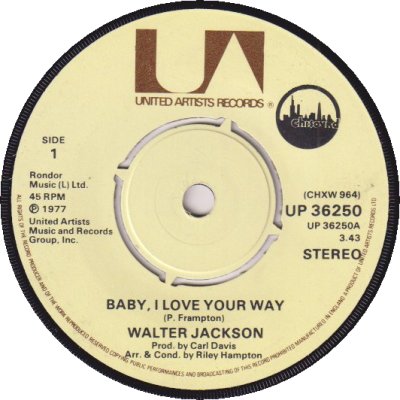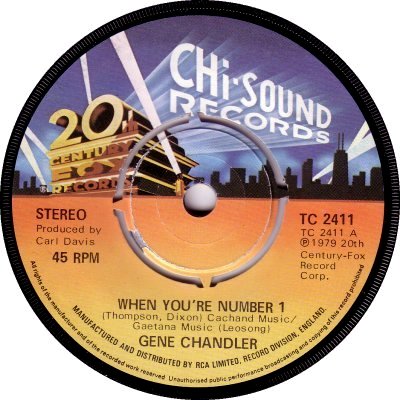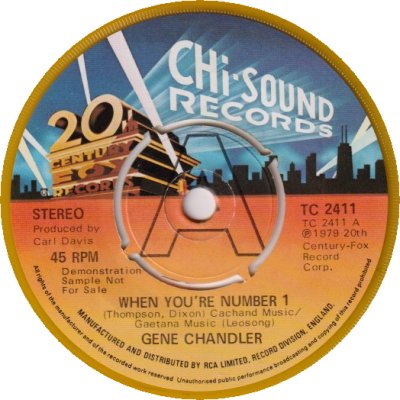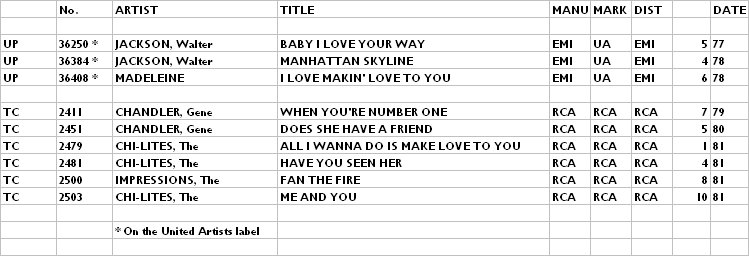


American, out of Chicago. From 1966 until 1976 producer Carl Davis occupied senior management positions at Brunswick Records, from A&R director to executive vice president, with a great deal of success. He left that company in June of the latter year and started his own label, Chi-Sound, on the same day. Several of the Brunswick Staff joined him in the new venture. He set a distribution deal with United Artists immediately. Under the deal he was required to produce six or seven artists for UA, after which point he was free to offer subsequent productions to other companies. His intention was to limit Chi-Sound to ten artists, so that he would be able to concentrate on them individually. As a gesture of pride in his home city, albums were to have a logo featuring Chicago on them, while LP covers would show scenic parts of the city, with or without the artists ('Billboard', 9th October 1976). In addition the labels featured the Chicago skyline. United Artists were enthusiastic about the deal, as evidenced by a full-page advert in 'BB' of the 2nd of October, which reminded readers that Davis had been responsible for fifteen gold albums as a producer.
After some eighteen months or so, Chi-Sound moved to 20th Century-Fox Records (q.v.), under what 'BB' of the 22nd of July 1978 described as a 'split label' deal; the names of both companies were given equal billing and the top half of the label design consisted of an amalgamation of their logos. 20th Century-Fox Records ran into turbulent financial waters in the late '70s and early '80s, and in the summer of 1981 Chi-Sound's arrangement was reduced to a more conventional licensing one; in addition Davis agreed to reduce the number of artists on his roster to three - Gene Chandler, The Impressions and The Chi-Lites ('BB', 22nd August). The arrangement ended not long afterwards, as 20th Century-Fox Records was put up for sale in November. According to BB of the 28th, Davis's deal still had a couple of years to run but it contained a 'get out' clause; he was considering his options, which included making a deal with whichever company's bid for 20th was successful. In the event, after 20th Century-Fox was bought by Polygram, early in 1982, Chi-Sound continued as an independent, accompanied for a while by stablemates Kelli-Arts ('BB', 28th November 1981) and Chi-Sound International ('BB', 5th May 1982). It seems to have ceased operations in 1983, though it enjoyed a revival in 1989-90 and again in the 2000s. Musically speaking, it concentrated on Soul and Disco.
As far as Britain is concerned, a trio of the company's singles appeared on United Artists with a Chi-Sound 'cityscape' logo (1) in 1977-78. In January 1979, after the link-up with 20th Century-Fox, Gene Chandler's 'Get Down' b/w 'Greatest Love Ever Known' reached No.11 in the Charts, but it came out on the 20th Century-Fox label (BTC-1040) without any regerence to Chi-Sound. Chi-Sound had to wait until the middle of that year to get proper label recognition. When it did, its name appeared in tandem with that of 20th Century-Fox (2), as was the case in the States. It issued a couple of singles by Chandler here in 1979-80; both of them were minor hits, 'Does She Have A Friend' b/w 'Let Me Make Love To You' (TC-2451; 5/80) making the bigger impression - it reached the No.28 spot. 1981 was busier, with three singles by The Chi-Lites and one by The Impressions, but none of them troubled the Chart compilers. British Chi-Sound singles shared a TC-2000 numerical series with those of 20th Century-Fox, and manufacture and distribution were by RCA, as they were for 20th itself. One label design served throughout; demo copies were marked with a hollow 'A' and the appropriate text (3).



Copyright 2006 Robert Lyons.

